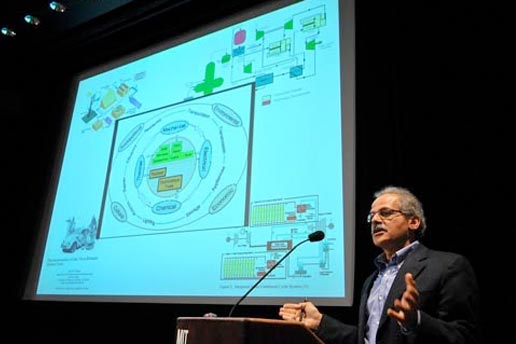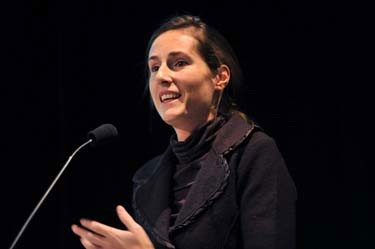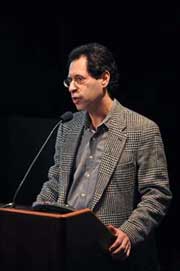
A multidisciplinary group of professors outlined spring classes in energy to students attending the Energy Education Blitz during MITEI’s Energy Futures Week in mid January. Moderator Jefferson Tester, H.P. Meissner Professor of Chemical Engineering, also discussed the goals of the MITEI Energy Education Task Force, which he co-chairs with Angela Belcher, Germeshausen Professor of Materials Science and Engineering and Biological Engineering.
In his introductory remarks, Tester noted the abundance of energy-related classes across the Institute. About 80 subjects with significant energy content are now being taught. Of those, about 75 percent are technology classes, 15 percent policy and management, and 10 percent science. “There’s a lot of faculty interest and a lot of student interest” in the expanding energy curriculum, he said.
About a dozen spring offerings were highlighted at the blitz. Among them, some already are playing to overcapacity crowds. Economics instructor Arthur Campbell’s “Energy Economics and Policy” (course number 14.44/14.444), limits enrollment to 30 students. About 100 students tried to get into the class last year. The class will use a variety of reading materials available electronically (but no textbook) and will focus on energy economics as opposed to general energy policy. It will cover theoretical and empirical topics related to energy demand, energy supply, energy prices, environmental consequences of energy consumption and production, and public policies affecting energy demand, supply, prices, and environmental effects. First priority for the class will be given to MIT undergraduates who have completed 14.01 and are scheduled to graduate in Spring 2008.
Marilyne Andersen, assistant professor of building technology, will offer “Introduction to Building Technology” (4.401), an undergraduate class focused on fundamental understanding of the technology aspects in building design. “There is a design project in the class,” she said. “Students will choose a building and analyze it for energy balance and sustainability, and then relocate the building to a different climate and look at the changes needed in the building.”

Andersen also highlighted “Analysis and Design of Heating, Ventilation, and Air Conditioning Systems” (2.67J/4.427J) and “Building Technology IV: Energy in Building Design” (4.464). Both are graduate courses and will be taught by Leon Glicksman, professor of architecture and mechanical engineering, and Leslie Norford, professor of architecture. The former class will include field trips to visit typical HVAC systems and will culminate in a team project to design a medium-sized HVAC system. The latter class emphasizes concepts and methods for designing energy efficient and environmentally responsible buildings; students will perform qualitative, critical assessments of energy-related features in an existing building and will apply energy-efficiency concepts in a creative design project.
David Perreault, associate professor of electrical engineering and computer science, will teach “Power Electronics” (6.334), considering electronic circuits for processing and controlling electrical energy. “The course focuses on the techniques needed to design systems anywhere you need to convert electrical energy,” Perreault said. “A lot of people who come out of this class go right into industry.”
 Jonathan Raab, visiting lecturer in urban studies and planning, describes “Energy Policies for a Sustainable Future” (11.369J/17.398J/ESD.934). Students will learn about a range of current energy policies and energy-related environmental policies that foster the development and mass deployment of sustainable energy technologies, fuels, and practices. Photo: Justin Knight
Jonathan Raab, visiting lecturer in urban studies and planning, describes “Energy Policies for a Sustainable Future” (11.369J/17.398J/ESD.934). Students will learn about a range of current energy policies and energy-related environmental policies that foster the development and mass deployment of sustainable energy technologies, fuels, and practices. Photo: Justin KnightMort Webster, visiting assistant professor in earth, atmospheric, and planetary sciences, described “Global Climate Change: Economics, Science, and Policy (15.023/12.848/ESD.128J), which he will teach with Professors Henry Jacoby and Ronald Prinn, co-directors of MIT’s Joint Program on the Science and Policy of Global Change. The class will introduce students to the scientific, economic, ecological, and institutional issues underlying the threat of global climate change. Students will learn an integrated approach to analyzing climate change processes and assessing proposed measures. Other activities will include the simulation of international negotiations, with student teams representing the various stakeholders involved.
Demonstrating the breadth of energy offerings, Berhardt Trout, professor of chemical engineering, described “A Philosophical History of Energy” (10.04J/24.114J), which he will teach in collaboration with Experimental Study Group Lecturer Lee Perlman. The class will focus on reading original papers by Aristotle, Bacon, Boltzman, Carnot, Descartes, and others in order to investigate the central philosophical and scientific debates about energy.
In addition to learning about specific classes, students attending the blitz heard about MITEI’s Energy Education Task Force and its mission. Tester noted that the task force was established in late spring 2007 to coordinate the development of energy education at MIT. Among its activities has been reviewing existing energy-related curricula, identifying and evaluating gaps, and assessing student and faculty interest in filling them.